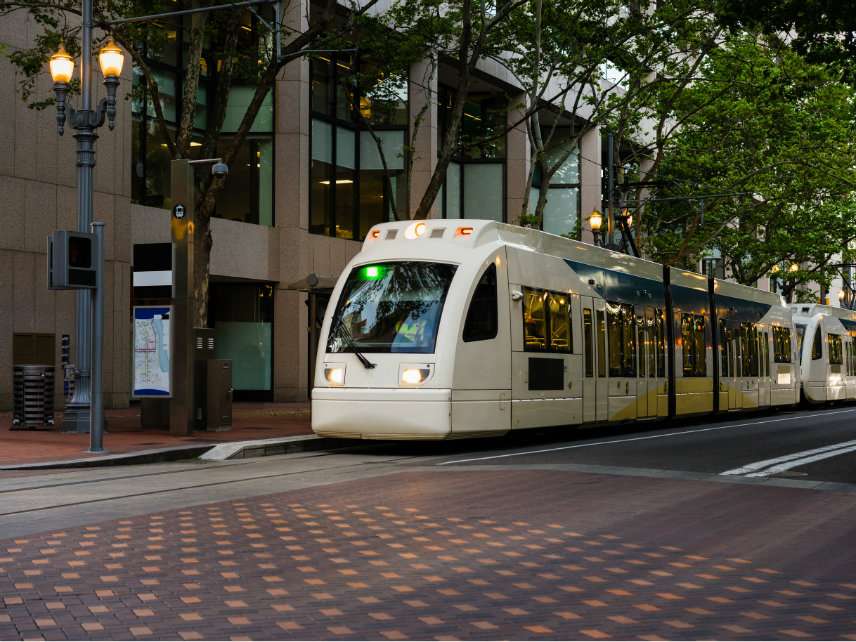Critics of Corporate Campaign Cash Silent When Donors to Light Rail Initiatives Ink Light Rail Contracts
Complaints about corporate influence in elections are almost never actually about the corporate influence.

Worries about corporate cash buying elections have far more to do with the candidates and causes that the money is being spent on than any principled objection to monied interests influencing votes. Nothing illustrates this better than the double standards applied to corporate donations to light rail ballot initiatives.
In May, a Nashville light rail ballot initiative went down in flames, with two-thirds of voters rejecting it. A month later, The New York Times published a story pinning the blame on Charles and David Koch, who supposedly sunk Nashville's initiative and others like it just to line their own pocket books. (Disclosure: Charles and David Koch have also given money to the nonprofit that publishes Reason.)
In the two weeks since the Times story's release, public transit boosters in the media have spread this narrative far and wide.
"Thanks for exposing the ulterior motives of the Koch brothers, who oppose public transit projects as their conglomerate reaps profits from oil and gasoline production," wrote Paul P. Skoutelas, the president of the American Public Transportation Association, in a letter to the Times.
"Excellent story showing how Kochs push their oil biz interests, disguised as philosophy," tweeted Jane Mayer, a writer at The New Yorker. "The willingness of big money interests to attack local transit proposals should be a warning to Massachusetts," wrote Renee Loth at The Boston Globe. Similar takes made the rounds on such progressive-leaning websites as Daily Kos, Common Dreams, Jalopnik, and Streetsblog.
Meanwhile, a far more direct and clear-cut example of corporations reaping benefits from their involvement in light-rail politics was going completely unnoticed.
A couple days after the Times piece hit newsstands, Phoenix's Valley Metro transit agency announced that it was awarding a design contract for its 1.5-mile Northwest Phase II light rail extension to Jacobs Engineering Inc. The value of the contract has not been disclosed. What has been disclosed is Jacobs' donations to the ballot initiative that made its new contract possible.
In 2015, the firm gave $10,000 to support Prop. 104, a transit initiative that boosted Phoenix's sales tax to pay for building out its then-20-mile light rail network. Flush with Prop. 104–provided cash, the Phoenix City Council voted in 2016 to accelerate the Northwest Phase II timetable, and with it the need to take on contractors like Jacobs.
This kind of self-serving corporate activism in the norm for a firm like Jacobs. In 2016, for example, the company gave $50,000 to support Los Angeles' Measure M, which approved $120 billion in spending on public transit improvements in the next 40 years. The measure passed with nearly 70 percent of the vote, and Jacobs is already cashing in. In 2017, the company was named as a subcontractor for "program management support services" for Measure M projects.
Plenty of other firms engage in this kind of behavior. The engineering consultants Parsons Brinckerhoff Inc. also donated $200,000 to support Measure M. The measure has since provided funding for a light rail extension the company had been hired to work on.
Another repeat donor is the engineering firm Siemens, which gave $5,000 to Phoenix's Prop. 104 and has since been awarded a $57.9 million contract by Valley Metro to supply 11 light rail cars. A similar story played out in Seattle, where Siemens donated $50,000 to the city's 2016 Sound Transit 3 ballot initiative, which would spend $54 billion adding 62 miles of light rail. The initiative passed, and Siemens then nabbed a $155 million contract to supply 30 new rail cars to the network.
Almost 90 percent of transportation ballot initiatives won in November 2017. Nearly 70 percent garnered voter approval in 2016. The years 2013, 2014, and 2015 all show the pass rate for public transit ballot initiatives hovering just above 70 percent. Given that these initiatives involve usually-loathed tax increases, this is a remarkable feat—one made possible in part by comically lopsided funding ratios between the "yes" and "no" campaigns.
Phoenix's Prop 104 campaign saw the official "yes" campaign committee receive a little over $1 million in donations from contractors, engineering firms, trade unions, and others. The only two registered "No" campaign committees received about $4,000 combined.
The same goes for Seattle's Sound Transit 3 initiative. The Seattle Times reported in October 2016—two weeks before voters went to the polls—that the pro–Sound Transit 3 side had scooped up over $3 million in donations, about 10 times more than the $300,000 opponents had been able to scrape together.
Los Angeles' Measure M election saw $36,000 donated to the official No campaign. The Yes side received donations in excess of $10 million.
One might think that this repeated sequence of events, whereby corporate donors spend big on one-sided public transit campaigns and then ink contracts to build said transit, would provoke at least a little bit of concern from commenters who frame their criticism of anti-light rail campaign spending in terms of opposition to undue corporate influence.
Yet news about who gets the contracts to build light rail networks after the votes have been counted rarely appear outside trade publications. These stories certainly don't appear on the front page of The New York Times. Should saintly light rail win on election day, that's obviously the will of the people. Only when this anointed transit option loses do we need to go asking questions about what nefarious puppet masters deceived the voters.
Rent Free is a weekly newsletter from Christian Britschgi on urbanism and the fight for less regulation, more housing, more property rights, and more freedom in America's cities.


Show Comments (18)